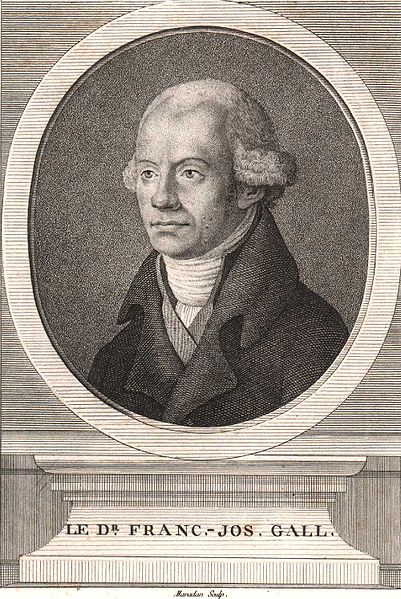<Back to Index>
- Neuroanatomist Franz Joseph Gall, 1758
- Poet and Artist Taras Hryhorovych Shevchenko, 1814
- People's Commissar for Foreign Affairs Vyacheslav Mikhailovich Molotov, 1890
PAGE SPONSOR

Franz Joseph Gall, M.D. (9 March 1758 – 22 August 1828) was a neuroanatomist, physiologist, and pioneer in the study of the localization of mental functions in the brain.
Gall was born in Baden, in the village of Tiefenbronn to a wealthy Roman Catholic wool merchant. The Galls had been the leading family in the area for over a century. As the second eldest son, he was intended for the priesthood but chose instead to study medicine at the University of Strasbourg. He later completed his degree in Vienna, Austria. Around 1800, he developed "cranioscopy", a method to determine the personality and development of mental and moral faculties on the basis of the external shape of the skull. Cranioscopy («cranium»: skull, «scopos»: vision) was later renamed to phrenology («phrenos»: mind, «logos»: study) by his follower Johann Spurzheim.
Gall's concepts on brain localization were revolutionary, and caused religious leaders and some scientists to take exception. The Roman Catholic Church considered his theory as contrary to religion (that the mind, created by God, should have a physical seat in brain matter was anathema). Established science also condemned these ideas for lack of scientific proof of his theory. His ideas were also not acceptable to the court of Franz Josef II (the brother of Marie Antoinette). Due to this opposition, Gall left his lecturer position in Austria. He sought a teaching position in Germany and eventually settled in Paris. Revolutionary France was most likely the most hospitable place for Gall's theories. However, Napoleon Bonaparte, the ruling emperor, and the scientific establishment led by the Institute of France, pronounced his science as invalid. Despite all this, Gall was able to secure a comfortable existence on the basis of his speciality. Gall became a celebrity of sorts as he was accepted into Parisian intellectual salons.
Gall's phrenological theories and practices were best accepted in England, where the ruling class used it to justify the "inferiority" of its colonial subjects. It also became very popular in the USA from 1820 to 1850. The misuse of Gall's ideas and work to justify discrimination were deliberately furthered by his associates, including Johann Spurzheim. Later, others tried to improve on his theories with systems such as characterology.
In spite of the many problems associated with his work, Gall made significant contributions to neurological science. In 1823, he was elected a foreign member of the Royal Swedish Academy of Sciences.
Gall died in Paris, on 22 August 1828. Although married he had no direct descendent. However, direct descendants of his brothers lived in Germany until 1949. A collection of his skulls can be seen at the Rollet Museum in Baden bei Wien, Austria, where several of his relatives now live.
Gall's theories had an influence both on the Italian criminologist Cesare Lombroso and on his French rival, Alexandre Lacassagne.